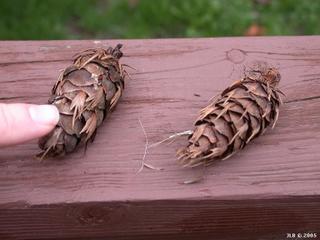Saturday, October 03, 2009
Wednesday, May 06, 2009
Of Rain and Bud Burst





Spring is in full-swing here in the Pacific Northwest, and we have enjoyed many fine days of rain. I thrive on the grey and the wet, and so do the evergreens.
A few days ago, I slipped out to catch a photo of the first dogwood tree which I have found thus far on my property. Everyone around seems to have big, happy dogwoods, and I was beginning to feel left out. These shy, slow-growing jewels hide quietly among their evergreen partners; then emerge with their unique, opalescent grace of big, buttery blossoms.
Meanwhile, I spotted the first emergence of fresh evergreen tips on the tallest Douglas firs, and their shorter companions are not far behind. The rain has every tree swelling; alders are transformed from sticks to thickets; ferns and mosses creep out from the woodwork; wheelbarrow traffic must pause for crossings of salamanders and frogs.
It’s easy to get lost gazing skyward, but the forest floor is rich with new growth: lichens, mosses, and shrubs of all kinds are ready for fruit and flower. Soon, I will be able to share the rhododendrons, salal, and huckleberries. Today, I conclude our images with the soft leaves of the foxglove, and the patient reawakening of the salmonberry.
Posted by
Jade L Blackwater
at
1:54 PM
0
comments
![]()
Labels: dogwood, Douglas fir, rain, salmonberry, shrubs, spring, trees, Western white pine
Friday, December 19, 2008
Snow Cones
Posted by
Jade L Blackwater
at
12:47 PM
2
comments
![]()
Labels: cones, conifers, Douglas fir, evergreens, forests, Psuedotsuga, snow, trees
Monday, June 30, 2008
Fresh Growth on Douglas Firs
Posted by
Jade L Blackwater
at
8:58 AM
2
comments
![]()
Labels: conifers, Douglas fir, evergreens, forests, growth, Kitsap, needles, Psuedotsuga, summer, trees
Monday, November 14, 2005
Revelations


As the deciduous trees lose their leaves, they slowly reveal the internal structures of the forests and tree spaces around us. In the PNW, we see their evergreen understudies shine through, and the architecture of each tree-skeleton reveals the basis for the shape of the canopy we are so accustomed to seeing.
Posted by
Jade L Blackwater
at
9:24 AM
0
comments
![]()
Labels: autumn, Big leaf maples, Douglas fir, trees
Thursday, October 13, 2005
Mice in the cones...

Greetings!
Thanks to two of our readers, we have a little information to supplement my post "Check out the size of those cones!" from October 07, 2005.
Here’s what the Arborealists have to say:
RMD tells us:
"…so in the little known facts department - the mice hanging out of the cones are brachts that are unique to Douglas Fir which really isn't a true fir. It's the common tree here in the lowlands [West of Cascades] that everyone calls fir but the scientific name is Psuedotsuga because the cone morphology is closer to Tsuga (Hemlocks). True firs are Abies - like the Alpine fir or the Grandfirs. In true firs the cones fall apart when they are ripe."
And many thanks to AND for filling in my memory gaps:
"If my memory serves me, the owl wanted to eat the mice & tricked them into in the cones by telling them that is where they'd be safe from the fire..."
Thanks guys!
And, for those of you who are unfamiliar with the Douglas Fir, here is a picture of a couple cones. Unfortunately, the closest Doug Firs are on the other side of the fence, and somehow I doubt the neighbors would believe that I was just collecting cones… so… this is a picture of an older cone specimen, likely from last year.
Friday, October 07, 2005
Check out the size of those cones!
Good morning! Here's another picture of some trees in parking lot b. If you look closely, you can see all the swelling cones on this pair of gorgeous firs!
When I was about eight years old I took a field trip to a local park where we walked along trails with a guide. As usual, I drifted into my own thoughts, preferring to slip among the trees when no one was looking.
I did listen up long enough to hear the guide tell a couple folk tales about fir cones (seems as though she was trying to kill time). I remember somehow thinking that her stories were rather unconvincing (not the first time for me), but strangely, I’ve never quite forgotten the telling.
I can’t seem to find these stories online (at least not quickly), so here’s what I remember:
Back in the days of fairy tales the owl was the wisest in the forest. One day, a massive fire swept through the wood, and the frightened mice cried out, “Owl! What should we do?!” Owl told them to get the heck out of Dodge, and as usual, the mice didn’t listen. Instead, they climbed the nearest fir trees and hid inside the fir cones, hoping that the fire would pass them by. Their failure is evidenced by looking at a fir cone, where you’ll notice the bottom half of the mice hanging out from under the cone plates.
The second story had to do with deer… if you crack off the little cone plates, you can see deer tracks on the underside. Perhaps I half-heard the second bit on some other field trip during which I was lost in my own thoughts…
Was anyone else paying attention?
Posted by
Jade L Blackwater
at
8:20 AM
2
comments
![]()
Labels: cones, conifers, Douglas fir, Evergreen State College, evergreens, moon, stories






 Follow Jade Blackwater on Twitter
Follow Jade Blackwater on Twitter

